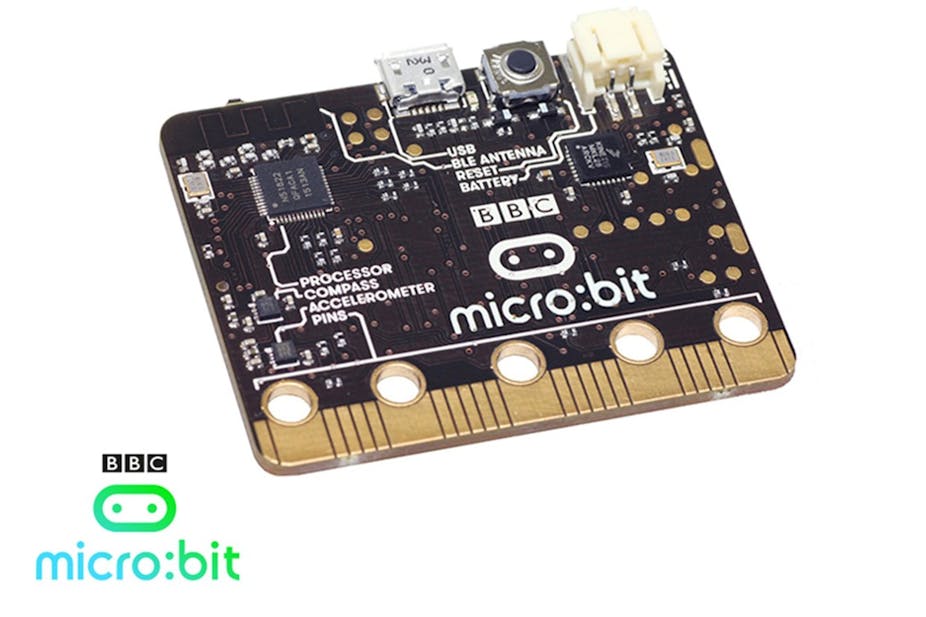The way computing is taught in schools is going through its greatest upheaval since the subject was first introduced at the turn of the century. After considerable lobbying by the industry, professional societies, universities and schools, the national curriculum has been re-oriented towards establishing computing as the “fourth science” for schools.
Out go interminable lessons on how to use specific word processor or spreadsheet applications. In comes more rigorous teaching about the scientific principles of technology and how to put it to use creatively – to be taught, importantly, by example rather than by rote.
Plugged in to this change of tack is the recently announced BBC micro:bit, a tiny, inexpensive pocket-sized computing device. The BBC plans to give away a million of these devices free to every Year 7 child (11 to 12-year-old) in the country this autumn, to encourage children to become a generation of digital creators.
Conceived by the BBC, the micro:bit has been developed by organizations including ARM, Microsoft, Freescale, Nordic Semiconductor, Element 14, Samsung and Lancaster University.
One of the goals of this initiative is to create a greater number of students that go into computer science and related fields of study with a better understanding of technology, transforming the UK from a nation of digital consumers into a creative powerhouse. To place this in context, a recent House of Lords select committee report suggested some 35% of current jobs in the UK could be lost to automation over the next 20 years. In my personal opinion, that’s an understatement. The strategy for the nation here is made clear: to create new jobs through digital innovation. This will only be possible if today’s children are adequately skilled and motivated to rise to this challenge.
This is an ambitious strategy, and one that requires an equally ambitious approach to delivering it. The response to this call to arms has been quite simply staggering. Not from the government, but from enthusiasts, volunteers and evangelists. To name but a few such organisations picking up the challenge: Computing at Schools support almost 20,000 teachers throughout over 600 regional UK hubs, Code Club organise after school programming clubs throughout the UK and Teen Tech who expose teenagers to the wide range of career possibilities in science, engineering and technology.

Not the BBC’s first computer
But we’ve been here before. It’s hard not to draw a parallel to the Model B, a computer released by the BBC in the 1980s for the same reason – to forge a new technologically-savvy generation of future students, innovators and entrepreneurs. The BBC Model B typified the computer of its day, a modestly-specified desktop machine with integrated keyboard that could connect to a home television. At just 4cm by 5cm, the micro:bit is a very 21st-century computer: compact, with built-in sensors and wireless communication, and an ARM Cortex M0 processor around 18 times more powerful than its forerunner.

The micro:bit supports Bluetooth Low Energy, which means it can interact wirelessly with other nearby devices such as mobile phones and tablets. This pitches it more as part of the emerging internet of things, made up of small low-powered devices that can provide services or data to other, more powerful devices such as smartphones.
It has a simple display of 25 LEDs arranged in a 5x5 matrix, just enough for simple graphics and text, and it is also equipped with an electronic compass and three-axis accelerometer so it can detect its orientation, and standard connectors that provide an easy way for children to integrate the micro:bit into their own creative electronics projects. It’s not a motivational toy – it’s a computing case study, a simple demonstrator for how complex computers can be used.
Building a community, not just a device

The device is only part of the package. The micro:bit can be programmed through the web, in a variety of programming languages tailored for different levels of ability. It will support highly visual drag-and-drop languages ideal for beginners, Microsoft’s Touch Develop, Python and JavaScript for intermediate users, and C++ for older, experienced programmers. The accompanying website also provides teachers access to pre-written learning resources and also a platform to create and share their teaching materials with other teachers, or to publish their pupil’s work if appropriate to inspire others.
After the initial 1m units are delivered, the devices will be available for commercial purchase with proceeds directed to a not-for-profit foundation. All the micro:bit hardware and software will be open-sourced, allowing others to build on the foundations laid.
The micro:bit is aimed at fostering an ecosystem to support digital creativity, balancing motivation and education while reducing the barrier to entry for both children and teachers. Will it be successful, inspiring fond memories in a generation like the Model B? We’ll see.

